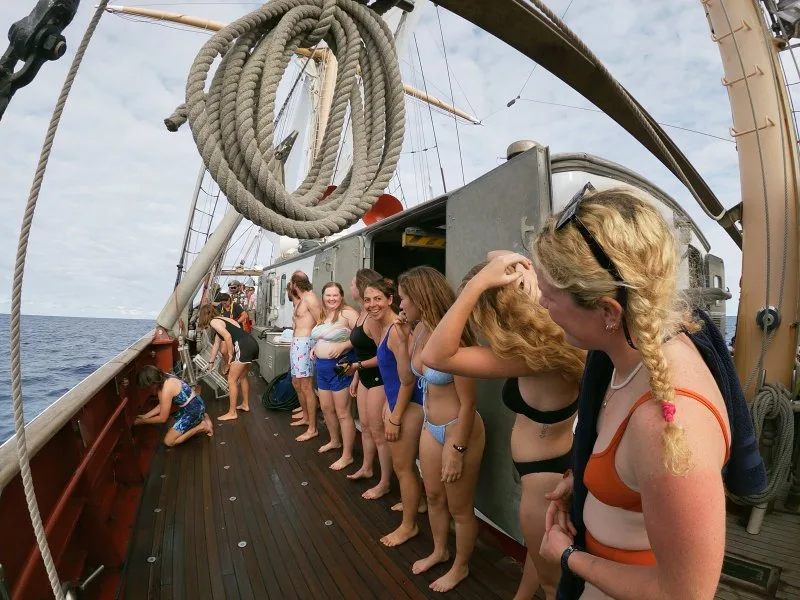Programs Blog
Some Words on the Birds

Emily Rogers, C Watch, Kenyon College
Ship’s Log
Noon Position
16 degrees, 47.9 minutes North, 124 degrees, 07.2 minutes West
Ship Heading
175°
Wind, Weather and Sail Plan
Cumulous cloud cover, wind East x North
Description of Location
About 1,000 miles southwest of San Diego
I didn’t realize there would be birds out here. Miles and miles away from shore in the Pacific I thought the only life I’d see would be the other people on this boat, and the underwater creatures we catch for science. To my surprise, even though we are over 1000 nautical miles, several days and nights from the nearest land, there are birds flying around our heads.
Aren’t they tired? There are zero trees to perch on, no structures suitable for a nest to sleep in. The albatross is one bird species out here, and they’ve evolved to survive without land for most of their life. They only return to land to reproduce, and otherwise they fly above the sea, swooping down to catch fish. Albatross barely have to flap their wings because they’re designed to soar. Apparently, albatross are able to sleep by shutting off half their brain while still soaring.
I saw another bird yesterday, one that hasn’t evolved like the albatross and therefore does not belong anywhere near here. It was a small yellow and tan finch.
The finch probably got blown out to sea by strong winds and spotted our ship as a place to rest. I cried when I heard about this. Birds are precious to me and thinking about the several days the finch was out over the ocean with no food or water was awful. Additionally, there is zero chance the small bird could fly back home from here. The inevitability of this bird’s death brought me to tears. I was still crying when I saw it. A group of four people surrounded the finch as it hopped around on deck and flew in short circles. It landed on my ear and I could feel its little bird feet cling to me. It ate some watermelon and muffin crumbs. A good meal for a finch, and tragically, probably its last. I haven’t seen the finch since then, and I can assume that it’s gone.
I feel extra sad about the finch because birds make me think of my family. My mom’s face will light up when a hummingbird drinks the sugar water she puts outside every day. My dad once witnessed a goose get hit by a car on our street and he buried it in our backyard because he wanted to give it a respectable funeral. My parents care about birds, and I miss them. The isolation from family is the hardest thing about this experience. To my family, I love you and I can’t wait to tell you all about it when I get home.
Emily Rogers, C Watch, Kenyon College
Recent Posts from the Ships
- Ocean Classroom 2024-A collaborative high school program with Proctor Academy
- Collaborations and Long-term Commitments: SEA’s Caribbean Reef Program Sets a Course for Coastal Programs that Compliment Shipboard Experiences.
- Sea Education Association students prepare for life underway using state of the art nautical simulation from Wartsila Corporation.
- SEA Writer 2022, Magazines From the Summer SEA Quest Students
- Technology@SEA: Upgrades Allow Insight into Ocean Depths
Programs
- Gap Year
- Ocean Exploration
- High School
- Science at SEA
- SEA Expedition
- SEAScape
- Pre-College
- Proctor Ocean Classroom
- Protecting the Phoenix Islands
- SPICE
- Stanford@SEA
- Undergraduate
- Climate and Society
- Climate Change and Coastal Resilience
- Coral Reef Conservation
- Marine Biodiversity and Conservation
- MBL
- Ocean Exploration: Plastics
- Ocean Policy: Marine Protected Areas
- Oceans and Climate
- Pacific Reef Expedition
- The Global Ocean: Hawai'i
- The Global Ocean: New Zealand